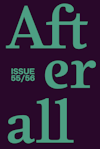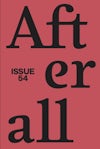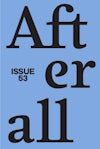
Issue 28
Autumn/Winter 2011
Issue 28 looks at a range of critical strategies: from Jean-Luc Moulène’s analysis of material production to Ricardo Basbaum’s engagement of the audience to Emily Wardill’s focus on the filmed object. Plus the first English translation of a text on the New York underground by Hélio Oiticica.
Editors: Pablo Lafuente, Nuria Enguita Mayo, Dieter Roelstraete, Melissa Gronlund, Stephanie Smith, Shumi Bose.
Founding editors: Charles Esche, Mark Lewis.
Table of contents
Foreword
Contextual Essays
- Unrepresentable Enemies – Tom McDonough
- ‘Dig the Diversity in Unity’: AfriCOBRA’s Black Family – Rebecca Zorach
- Semiotic Ghosts: Science Fiction and Historicism – Peio Aguirre
Artists
Jean-Luc Moulène
- Jean-Luc Moulène: A ‘Plasticien’ – Caroline Hancock
- Jean-Luc Moulène: Photography as Training Manual – Sophie Berrebi
Emily Wardill
- Circuits and Subterfuge: Emily Wardill and the Body Imaginary – Melissa Gronlund
- The Allegorical Impulse, Revisited: Emily Wardill, in Fragments – Dieter Roelstraete
Ricardo Basbaum
- Ricardo Basbaum, Or That Elusive Object of Emancipation – Ricardo Basbaum & Pablo Lafuente
Ricardo Basbaum
- Post-Participatory Participation – Ricardo Basbaum
Lia Perjovschi
- Lia Perjovschi: Economy and Collection of Care in Transition – Ovidiu Tichindeleanu
Events, Works, Exhibitions
- TROPICAMP: Some Notes on Hélio Oiticica’s 1971 Text – Max Jorge Hinderer Cruz
- MARIO MONTEZ, TROPICAMP – Hélio Oiticica
Foreword
In the book Public Sphere and Experience: Toward an Analysis of the Bourgeois and Proletarian Public Sphere, published in 1972, Alexander Kluge and Oskar Negt write:
It has become obvious that a concept of production was at the base of social production all along (but concealed by the absolute domain of commodity production) — a concept that had as its object the production of agents of socialisation, of language, of the construction of the drive structure, the production of experience, of collective entities and public spheres, in other words, the production of life contexts. This concept of production is oriented toward the production of social wealth and the appropriation of the production by the producers themselves. The alternative to commodity-production society can be apprehended through it.
This ‘public sphere’ as the horizon of social experience and the production of life contexts provides the ground for many of the political, pedagogical and artistic proposals of the twentieth century, and runs through some of the artistic and political phenomena that are tackled in this issue of Afterall.
In 1906, José Oiticica, the grandfather of Hélio Oiticica, founded the Colegio Latinoamericano in Rio de Janeiro — a pedagogical centre that followed the libertarian model of the Escuela Moderna (Modern School), set up in Barcelona by Francisco Ferrer y Guardia in 1901. The Modern School was a cultural project that included a publishing imprint and a popular university, and aimed to be an educational and community centre. One of its basic beliefs was the conviction that education can be an instrument of social transformation. Alongside its comprehensive curriculum on art, the school sought to establish the idea that each student is his or her own master, and that everyone can learn from everyone else, even by chance. The Modern School spread during the 1910s and 20s throughout South America, Mexico and the US, including one in New York, where Man Ray taught.
In 1964, after his stay with the inhabitants of the Mangueira favela and samba school, Hélio Oiticica started making his Parangolé series, taking as a starting point the habitat and popular creativity of the Mangueira dancers. This experience was for him a profound revolutionary and political inspiration, allowing him to ‘discover my “individual position” as a person integrated in the world, as a “social being in its full sense”, and not as a member of a class or “elite”.’
This gesture by Oiticica is also one of the most lucid exercises of resistance to the dictates of colonial subordination in Latin America, and points to the core of the problematics of the relationship between artistic practice and pedagogy as emancipation (associated with the practice of the Modern School) and of the wider debate on the common and community (that is, about how to recuperate the idea of the public good in a contemporary context in which the common has been reduced, in most occasions, to commodity production or totalitarian ideologies). The gesture of becoming an other to oneself, of breaking with a community constituted through identities based on blood, land or social origin, implies a move from the ‘singular being’ to the ‘being with’, to a collective ‘us’ composed of an endless number of anonymous beings, one containing ‘whatever singularities’. Singularities like those put forward by the collective Tiqqun, who are discussed in the pages that follow as inheritors of the Situationist movement, and who assume ‘exile, separation and estrangement not as poetic or existential circumstances, but also as political’.
Purchase
The publication is available for purchase. If you would like specific articles only, it is also available individually and to be downloaded as PDFs.
Purchase full publication
Buy via University of Chicago Press
Buy via Central Books
Purchase individual articles
Buy via University of Chicago Press



